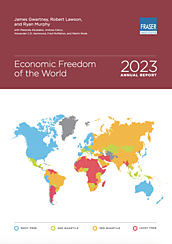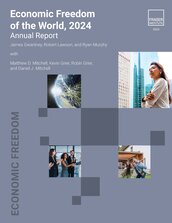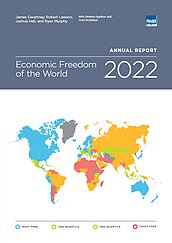This is the 28th edition of Economic Freedom of the World and this year’s publication ranks 165 countries and territories for 2021, the most recent year for which data are available.
Hong Kong and Singapore, as usual, occupy the top two positions—but for the first time in the history of the EFW index, Singapore edges out Hong Kong for the #1 ranking. The next highest-scoring nations are Switzerland, New Zealand, United States, Ireland, Denmark, Australia, United Kingdom, and Canada.
The rankings of some other major countries are Taiwan (11th), Japan (20th), Germany (23rd), Korea (42nd), France (47th), Italy (53rd), Mexico (68th), India (87th), Brazil (90th), Russia (104th), and China (111th). The 10 lowest-rated countries are: Republic of Congo, Algeria, Argentina, Libya, Iran, Yemen, Sudan, Syria, Zimbabwe, and Venezuela.
With the onset of the Coronavirus pandemic, global economic freedom fell dramatically in 2020 and remained at that level in 2021, a decrease that erased a decade of growth in economic freedom.
Nations in the top quartile of economic freedom had an average per capita GDP of $48,569 in 2021, compared to $6,324 for bottom quartile nations (PPP constant 2017, international $). Interestingly, the average income of the poorest 10% in the most economically free nations is more than twice the average income of all people in the least free nations. Life expectancy is 80.8 years in the top quartile compared to 65 years in the bottom quartile.
The first Economic Freedom of the World Report, published in 1996, was the result of a decade of research by a team which included several Nobel Laureates and over 60 other leading scholars in a broad range of fields, from economics to political science, and from law to philosophy.




